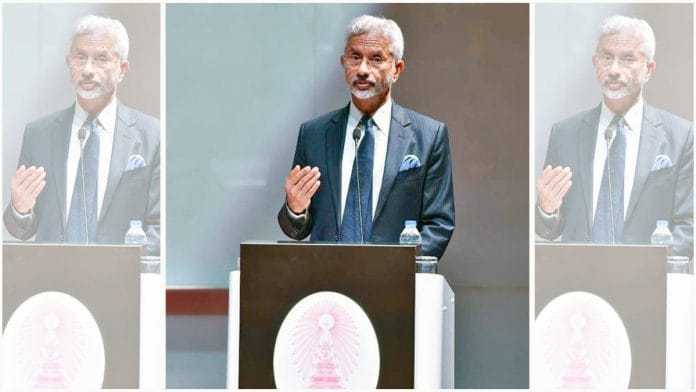New Delhi: External Affairs Minister S. Jaishankar Thursday said only countries that have mindsets “built around spheres of influence” and are “uncomfortable” with democratic thoughts will oppose the concept of a rules-based order in the Indo-Pacific, indirectly taunting China even as he stressed on “ASEAN centrality” within the strategic construct.
“This is about recognising the realities of globalisation and the consequences of rebalancing. Only those whose mindsets are built around spheres of influence and uncomfortable with the democratisation of world affairs will dispute the Indo-Pacific today,” he said, addressing the Chulalongkorn University in Bangkok.
He also spoke about the Quad — consisting of India, US, Japan and Australia — saying that the grouping is the “most prominent plurilateral platform that addresses contemporary challenges and opportunities in the Indo-Pacific”.
Jaishankar is currently on a two-day visit to Thailand for the 9th Meeting of the India-Thailand Joint Commission (JCM).
The minister also said that India’s interests now lie towards the East, beyond the Indian Ocean and into the Pacific, and hence, “a more collaborative outlook that transcends the orthodoxy of earlier theatres is the need of the day”.
“We envisage a free, open, inclusive, peaceful, and prosperous Indo-Pacific region built on a rules-based international order, sustainable and transparent infrastructure investment, freedom of navigation and overflight, unimpeded lawful commerce, mutual respect for sovereignty, peaceful resolution of disputes, as well as equality of all nations,” Jaishankar added.
During his visit, Jaishankar held elaborate meetings with his counterpart and deputy prime minister of Thailand, Don Pramudwinai. He also called on Thai PM Prayut Chan-o-cha Wednesday.
He also sought to push the long-pending India-Myanmar-Thailand Trilateral Highway, something that he had stressed during his recent visit to Cambodia too as New Delhi plans to extend the highway till Phnom Penh.
The trilateral highway, which is facing inordinate delays, will be connecting Moreh in Manipur to Mae Sot in Thailand via Bagan in Myanmar.
“India-Myanmar-Thailand Trilateral Highway, that has the potential of creating a completely new axis of economic activity in Asia, has had its fair share of challenges, but we are determined to bring it to an early conclusion,” Jaishankar said Thursday.
Also Read: ‘Important, timely read’ — Rahul Gandhi on new book that says China will defeat India in 10 days
ASEAN’s centrality in Indo-Pacific
Following in the US’ footsteps, Jaishankar also stressed on “ASEAN (Association of Southeast Asian Nations) centrality” in the Indo-Pacific.
“India envisages the ASEAN to be at the centre of the Indo-Pacific, both literally and substantively. Our ASEAN partners will surely note that our interactions with them have grown, not reduced, as a result of the Indo-Pacific,” he said.
In May this year, US President Joe Biden had stressed on this particular aspect during the first ever US-ASEAN Summit that was held in Washington D.C. with the 10-member bloc.
“We are confident that the entire Indo-Pacific region will benefit from its activities. And that is validated by the growing recognition of its importance in the international community,” Jaishankar said, adding: “If there are reservations in any quarter, these stem from a desire to exercise a veto on the choices of others. And possibly a unilateralist opposition to collective and cooperative endeavours.”
He added that the prospects for the global order depend on a “more equitable and democratic distribution of power and resources”.
“The world must be more multi-polar. Such a multi-polar world must necessarily have a multi-polar Asia at its centre. This will happen only if we Asian countries consolidate our independence and expand our freedom of choice,” said the minister.
(Edited by Gitanjali Das)
Also Read: Amid India-China tensions, Army conducts exercise ‘Skylight’ to test satellite-based systems






